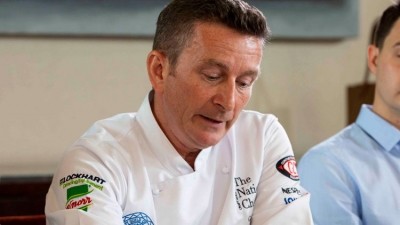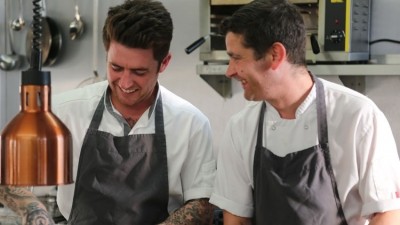Social enterprise: creating your brand as a chef

In a social media-connected world, chefs are better placed than ever to promote themselves. With this in mind, The National Chef of the Year held a roundtable event hosted by OpenTable’s Adrian Valeriano that saw past winners of the competition and other industry figures advise this year’s hopefuls on how best to build their own brands as chefs. Here’s what the panellists had to say.
Gary Jones, executive head chef, Belmond Le Manoir aux Quat’Saisons
Ruth Hansom, head chef, Wernher restaurant at Luton Hoo
Hayden Groves, executive chef, BaxterStorey
Frederick Forster, executive chef, Plateau
Hrishikesh Desai, head chef, HRiSHi
Karen Fewell, founder, Digital Blonde Marketing
Do chefs consider themselves brands?
HD: I’m not sure if I consider myself a brand, although the restaurant I work at is named after me. I’m an employee there.
GJ: The brand is Raymond Blanc really. Le Manoir and Raymond are inseparable. The brand I hope I have is someone that can train and develop chefs, as that’s what we’re know for at Le Manoir.
FF: In some respects I consider myself a brand, and in other respects I don’t. But competitions are an important part of my career and I do like to promote that.
How can chefs get across their own brand and differentiate themselves from everyone else and the businesses they work for?
KF: Everyone has a story. I did some research a while ago on consumer attitudes to chefs and restaurants on social media. People were much more willing to engage with the former. It’s more personal. My advice is to put yourself out there. People want to hear about your world.
RH: I’d like to use my brand to tell a story about a woman having a successful career in kitchens. I’d also like to use it to promote British produce as I think that’s important too.
How important is social media?
HG: Social media is key for me. I loved it when Twitter increased the character limit. Instagram is also great for showing people new dishes and techniques.
HD: I used social media when I was cooking at The French Laundry way back in 2010 and I got a huge amount of extra followers. The win at National Chef of the Year also improved my follower numbers. I don’t do Instagram yet, though.
How can social media be used to build a brand?
GJ: Raymond has a whole team of people on it. But for me personally I just try and tell a story. For example, the other day we had a new apprentice start at Le Manoir that we first came into contact with when he was at primary school, so we put a post out about that.
Can social media and brand building ever be problematic for chefs?
HD: Sometimes employers object to chefs using social media too much at work. It’s something that can be easily tracked.
GJ: I used to be a bit down on the idea of chefs as brands, I though it sounded corporate. But I think that was a naive view. I know understand that it drives business in a massive way.
HD: The hardest thing about getting your name out there as a chef is that time is against you, there is always so much other stuff to do both at work and at home.
What tips do chefs have for using the National Chef of The Year to you advantage?
FF: Don’t be afraid to use the title. I was afraid to use it at first but I think it’s something to be proud of. It can open doors. It can also benefit you team. Your chefs will be more likely to enter competitions if they know you have done it yourself.
BigHospitality will be covering The National Chef of the Year on Tuesday 2 October. Keep up with the competition on Twitter (@BigHospitality) and on the website.
How it works
The Craft Guild of Chefs National Chef of the Year is open to all chefs over the age of 24. Entrants are firstrequired to devise an innovative menu for four people, which is paper judged by the panel. 40 chefs then go through to the regional heats, which take place in London and Sheffield.
On the day (2 October), competitors are required to produce a three course menu for four covers within two hours using a mystery basket of ingredients. Service may begin after 45 minutes, in course order. This year, thefirst course most use live native lobster; the main course must involve whole grouse English grouse; and the dessert must be a modern interpretation of a classic British pudding incorporating seasonal British fruit.
This year’s finalists:
Derek Johnstone, head chef, Borthwick Castle
George Blogg, head chef, Gravetye Manor
Glenn Evans, head of food, Las Iguanas
Liam Fauchard-Newman, senior sous chef, Rhubarb
Martin Frickel, senior sous chef, The Forest Side
David Neilson, senior chef de partie, Number One at the Balmoral
Nick Smith, head chef, Harbour & Jones
Kuba Winkowski, head chef, The Feathered Nest Inn
Stefan Sewell, defence chef instructor, Combined Services Culinary Arts Team
Thomas Westerland, head chef, Lucknam Park Hotel & Spa


















